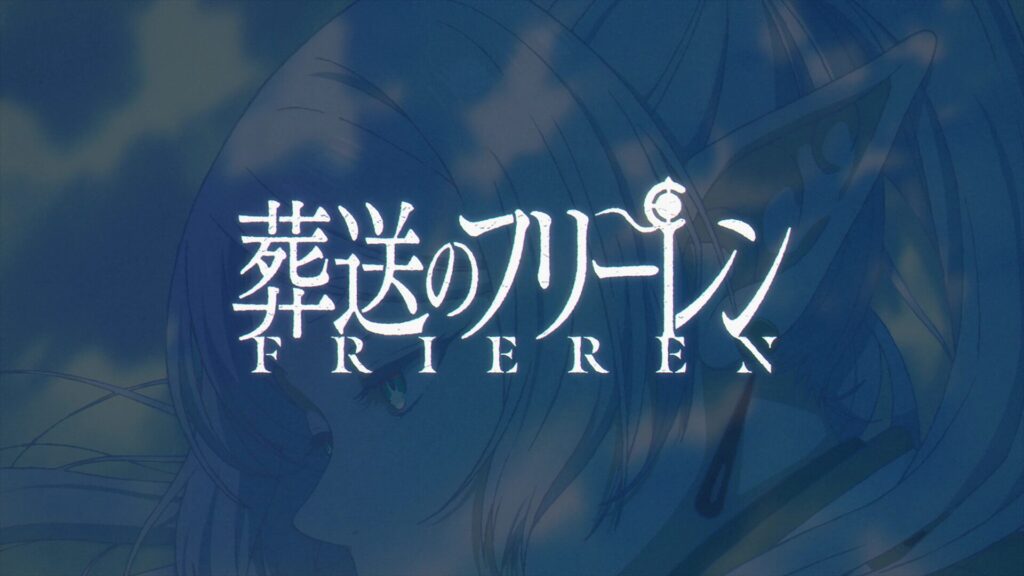
🟦 あらすじ:偽物でも、誰かの勇気になれる
Stark recalls the story /
シュタルクは振り返る、
of how he became determined /
自分がなぜ
to become a true warrior. /
本物の戦士を目指すようになったのかを。
Even with a fake sword, /
偽物の剣しか持っていなくても、
he vowed to defeat the Demon King /
彼は魔王を倒すと誓った。
and protect others. /
そして人々を守ると。
The group travels through snowy mountains /
一行は雪深い山を越えて、
and arrives at the Village of the Sword, /
「剣の里」へとたどり着く。
where the Hero’s Sword remains sealed. /
そこには勇者の剣が封印されていた。
Despite being unworthy in legend, /
伝説の勇者にはなれなかったとしても、
Himmel still saved the world. /
ヒンメルは世界を救った。
Meanwhile, Frieren reflects /
その間フリーレンは思い出す。
on Himmel’s legacy /
ヒンメルの残したものと、
and the importance of honoring memory /
記憶を讃えるということの大切さを。
through quiet gestures, /
それは静かな行動を通じて示される。
like cooking a meal or offering a word. /
たとえば料理や、ひとことの声かけのように。
🗣️ 語彙解説
recall /rɪˈkɔːl/(動詞):思い出す、回想する
→ 自分の記憶から呼び起こすときに使う、ややフォーマルな語です。
vow /vaʊ/(動詞):誓う
→ 「心に強く決める」という意味で、宗教的・厳粛な文脈にも登場します。
unworthy /ʌnˈwɜːrði/(形容詞):ふさわしくない
→ 「〜に値しない」という否定的評価を含みます。self-worthと対比されることも。
legacy /ˈlɛɡəsi/(名詞):遺産、遺志
→ 財産だけでなく、人が残した精神的な影響や価値観にも使われます。
gesture /ˈdʒɛstʃər/(名詞):身ぶり、象徴的な行為
→ 言葉以外の行動を通じて思いやりや意図を伝えるときの重要語です。
worthy /ˈwɜːrði/(形容詞):価値のある、ふさわしい
→ 人や行動が賞賛や努力に値することを指し、moral・ethicalな文脈にも合います。
セリフ #1 – 偽物でも、夢は本物
いいや、村の孤児院にハイターってムカつく奴がいてね偽物の剣しか持っていないから、偽物の勇者にしかなれないと僕に言ったんだじゃあ本物になってやろうじゃないか、そう思ったんだ僕はいつか本物の勇者の剣を手に入れて、魔王を打ち倒す
Not quite. See, there was this annoying brat named Heiter at the village orphanage.
He kept telling me I’d only ever be a fake hero because I wielded a fake sword. He was such a pain.
I figured if I proved him wrong, I’d have the last laugh. So here I am.
One of these days, I’ll hold the real Hero’s Sword in my hand and use it to defeat the Demon King.
🗣️ 語彙解説
brat /bræt/(名詞):ガキ、大人を困らせる子ども
→ 軽蔑的な響きをもつ言葉で、「生意気な子ども」と訳されることもあります。
wield /wiːld/(動詞):(武器などを)扱う、使う
→ 剣や魔法など、手にして使うもの全般に使われます。
prove someone wrong(表現):〜の間違いを証明する
→ 相手の予想や決めつけに反して結果を出すときの定番表現。
have the last laugh(表現):最後に勝つ、見返す
→ 一時的に笑われても、最後には成功して見返すこと。英作文にも使える熟語です。
fake /feɪk/(形容詞):偽物の、偽りの
→ 「本物でないこと」をストレートに言う表現。名詞としても使えます。
📘 文法・構文・訳しにくい点の解説
Not quite.
→ “not quite” は「そうじゃない」「ちょっと違うよ」とやわらかく否定する表現。
because I wielded a fake sword.
→ “because” は理由を表す接続詞。“wielded” は動作動詞の過去形で文法的にもポイント。
I figured if I proved him wrong, I’d have the last laugh.
→ 仮定法過去の構文。「if + 過去形, would + 動詞」の定番パターン。英検でも頻出。
One of these days, I’ll hold the real Hero’s Sword…
→ “One of these days” は「いつか近いうちに」という未来への希望を表す口語表現。
📗 スラッシュリーディング訳
Not quite. /
そうじゃないんだ。
See, there was this annoying brat named Heiter /
あのね、村の孤児院にハイターっていうムカつくやつがいて、
at the village orphanage. /
孤児院にいたんだ。
He kept telling me /
そいつはずっと僕に言ってきた。
I’d only ever be a fake hero /
「お前は偽物の勇者にしかなれない」って。
because I wielded a fake sword. /
偽物の剣しか持ってないからってね。
He was such a pain. /
本当に厄介なやつだったよ。
I figured if I proved him wrong, /
だから、そいつが間違ってるって証明できれば、
I’d have the last laugh. /
最後に笑えるのは僕だと思ったんだ。
So here I am. /
だから今、こうしている。
One of these days, /
いつかきっと、
I’ll hold the real Hero’s Sword in my hand /
本物の勇者の剣を手にして、
and use it to defeat the Demon King. /
魔王を倒してみせるんだ。
セリフ #2 – 伝説に挑んだ英雄たちの記憶
勇者の剣を守っていた里だこの里の近くの聖域には、女神様が授けたとされる勇者の剣が刺さっていたんだその剣は歴史上のどんな英雄たちが引き抜こうとしても微動だにしなかった80年前まではな
This village used to protect the Hero’s Sword.
According to stories, the weapon was hidden in a sanctuary somewhere close by, stuck inside a mighty stone.
Throughout history, many heroes tried to pull the sword from its rocky sheath, but none were successful.
Until 80 years ago, that is.
🗣️ 語彙解説
sanctuary /ˈsæŋktʃueri/(名詞):聖域、神聖な場所
→ 宗教的・伝説的に守られた場所を指します。神殿や避難所にも使われます。
mighty /ˈmaɪti/(形容詞):とても強い、巨大な
→ “a mighty stone” は「強大な石」で、英雄物語の語感にぴったり。
rocky sheath(表現):岩の鞘(さや)
→ “sheath” は「剣の鞘」。ここでは岩に刺さった剣の状態を詩的に表現。
pull ~ from ~(表現):〜から〜を引き抜く
→ 剣と鞘、岩からの抜刀などに使える表現。物理的にも比喩的にも使えます。
none were successful(構文):誰も成功しなかった
→ “none” は「誰も〜ない」を強調する形式。TOEICなどでも頻出。
📘 文法・構文・訳しにくい点の解説
This village used to protect the Hero’s Sword.
→ “used to + 動詞” は「かつて〜していた」。過去の習慣を表します。
According to stories, the weapon was hidden…
→ “According to 〜” は「〜によれば」という典型的な伝聞表現。文頭に置くことでフォーマルさが増します。
stuck inside a mighty stone.
→ “stuck” は “stick” の過去分詞で「刺さっている状態」。受動態で場所を示す構文です。
many heroes tried to pull the sword from its rocky sheath
→ “pull A from B” の構文と “rocky sheath” の詩的表現に注意。抽象的な比喩も読み取れるように。
Until 80 years ago, that is.
→ “that is” の挿入はカジュアルな補足表現。「つまりこういうことだよ」という口語的な意味合い。
📗 スラッシュリーディング訳
This village used to protect the Hero’s Sword. /
この村はかつて / 勇者の剣を守っていた。
According to stories, /
伝承によれば、
the weapon was hidden in a sanctuary /
その武器は / 聖域に隠されていた。
somewhere close by, /
このあたりのどこかに、
stuck inside a mighty stone. /
強大な石に / 刺さった状態で。
Throughout history, /
歴史を通じて、
many heroes tried to pull the sword /
多くの英雄たちが / その剣を引き抜こうとしたが、
from its rocky sheath, /
岩の鞘から、
but none were successful. /
誰一人成功しなかった。
Until 80 years ago, that is. /
それは / 80年前までの話だ。
セリフ #3 – 魔物が恐れる伝説の剣
あれは勇者の剣だ魔物が集まっていたのはこいつのせいだよ聖域は強力な結界で入れないのに、魔物はそれを破壊する衝動を抑えられないよっぽど勇者の剣が怖いんだろうね
That’s the Hero’s Sword in there.
It’s what draws so many monsters to the mouth of this cave.
A powerful barrier prevents them from gaining entry, but they can’t shake off the impulse to destroy the weapon.
They must be truly terrified of it.
🗣️ 語彙解説
draw /drɔː/(動詞):引き寄せる、誘引する
→ “draws so many monsters” は「多くの魔物を引き寄せる」という意味。TOEIC頻出。
mouth /maʊθ/(名詞):入口、開口部
→ ここでは “mouth of this cave” =「洞窟の入口」を意味する比喩的な表現。
barrier /ˈbæriər/(名詞):障壁、結界
→ 魔法による「保護の壁」や「バリア」のこと。ファンタジーでは定番。
impulse /ˈɪmpʌls/(名詞):衝動、突発的な欲求
→ “the impulse to destroy” は「破壊したいという衝動」。精神・心理面で使われやすい。
terrified /ˈterɪfaɪd/(形容詞):ひどく恐れている
→ “be terrified of ~” で「~をとても怖がっている」。恐怖の強さを示す表現。
📘 文法・構文・訳しにくい点の解説
That’s the Hero’s Sword in there.
→ “in there” は口語表現で「中にあるもの」を強調。語尾の “that’s” で確認的なニュアンス。
It’s what draws so many monsters to the mouth of this cave.
→ “It’s what 〜” は「〜するのはそれだ」という強調構文。原因を説明する場面で有効。
A powerful barrier prevents them from gaining entry…
→ “prevent A from B” の構文。「AがBするのを防ぐ」という意味で頻出構文。
…but they can’t shake off the impulse to destroy the weapon.
→ “shake off” は「振り払う、払いのける」。感情や衝動を抑える表現として登場。
They must be truly terrified of it.
→ “must be” は推量(〜に違いない)。“terrified of” の使い方も併せて覚えたい。
📗 スラッシュリーディング訳
That’s the Hero’s Sword in there. /
あれが / 中にある勇者の剣だ。
It’s what draws so many monsters /
それこそが / 多くの魔物を引き寄せている。
to the mouth of this cave. /
この洞窟の入口に。
A powerful barrier /
強力な結界が、
prevents them from gaining entry, /
彼らが中に入るのを / 防いでいるが、
but they can’t shake off /
それでも彼らは / 振り払うことができない。
the impulse to destroy the weapon. /
この武器を壊したいという / 衝動を。
They must be truly terrified of it. /
よほど / 勇者の剣を怖れているのだろう。
セリフ #4 – 本物かどうかに意味はない
いいじゃないか、偽物の勇者で僕は魔王を倒して世界の平和を取り戻すそうすれば、偽物だろうが本物だろうが関係ない
I don’t think there’s anything wrong with being a fake hero.
I’ll still defeat the Demon King and bring peace to the world.
And when I’m done, nobody’s going to be concerned about me being a fake or not.
🗣️ 語彙解説
fake /feɪk/(形容詞):偽物の、作り物の
→ “fake hero” は「偽物の勇者」。形容詞として人や物に付けて使われる。
defeat /dɪˈfiːt/(動詞):打ち負かす、倒す
→ 「敵や困難に勝つ」の意味で、ニュースや試験問題にも頻出。
concerned /kənˈsɜːrnd/(形容詞):気にする、関心がある
→ “be concerned about” で「〜を気にする、心配する」という表現。
be going to(助動詞句):〜するつもり、〜する予定
→ 話し手の強い意志や近い未来の予定を表す。
when I’m done(表現):終わったとき、完了したときに
→ “be done” は「終わる」「完了する」のカジュアルな表現。
📘 文法・構文・訳しにくい点の解説
I don’t think there’s anything wrong with being a fake hero.
→ “there’s anything wrong with ~” は「~に問題があるとは思わない」という柔らかな否定の構文。
I’ll still defeat the Demon King and bring peace to the world.
→ “still” によって「偽物でも関係ない、やってみせる」という意志の強さを際立たせている。
nobody’s going to be concerned about me being a fake or not.
→ “nobody’s going to be concerned about ~” で「誰も気にしない」。
→ “me being a fake or not” は “whether I’m a fake or not” に近い口語的省略。
📗 スラッシュリーディング訳
I don’t think /
私は思わない、
there’s anything wrong /
何か問題があるとは、
with being a fake hero.
偽物の勇者であることに。
I’ll still defeat /
私はそれでも倒す
the Demon King /
魔王を
and bring peace /
そしてもたらす
to the world.
この世界に、平和を。
And when I’m done, /
そしてそれを成し遂げたときには、
nobody’s going to be concerned /
誰も気にしないだろう
about me being a fake or not.
私が本物か偽物かなんて。
セリフ #5 – 美化される英雄の真実
勇者の剣が抜けなかっただなんて、カッコ悪いエピソードは英雄には不要でしょ英雄というのはどうしても、後世の連中が勝手に美化していくそしてそのうち、原型すらなくなってしまうんだ
It wouldn’t do for him to fail inside the cave. There’s no place for embarrassing stories in a hero’s tale.
When a new generation comes of age, they romanticize the heroes of the past.
The truth of who a person was falls away, and they become an idea.
🗣️ 語彙解説
fail /feɪl/(動詞):失敗する
→ “fail inside the cave” は「洞窟の中で失敗する」という意味。行動や使命に失敗することを指す。
embarrassing /ɪmˈbærəsɪŋ/(形容詞):恥ずかしい、気まずい
→ “embarrassing stories” で「恥ずかしい話」。ネガティブなエピソードを指す。
romanticize /roʊˈmæntəˌsaɪz/(動詞):美化する、理想化する
→ 現実よりも理想的に描くこと。歴史や人物評価でよく出る単語。
generation /ˌdʒɛnəˈreɪʃən/(名詞):世代
→ “a new generation comes of age” は「新しい世代が成長する」ことを表す定型句。
fall away /fɔːl əˈweɪ/(句動詞):消え去る、失われる
→ “the truth … falls away” で「真実が忘れられていく」という文学的な表現。
📘 文法・構文・訳しにくい点の解説
It wouldn’t do for him to fail inside the cave.
→ “It wouldn’t do for ~” は「~するのは望ましくない/ふさわしくない」の意味。控えめながらも否定的なニュアンスを出す表現。
There’s no place for embarrassing stories in a hero’s tale.
→ “There’s no place for ~” は「~は場違いだ」という表現。“in a hero’s tale” は「英雄譚において」。
When a new generation comes of age, they romanticize the heroes of the past.
→ “come of age” は「成人する/成長する」。“romanticize” が主動詞で「理想化する」ことを意味する。
The truth of who a person was falls away, and they become an idea.
→ “The truth of who a person was” は関係代名詞で「その人が本当はどういう人物だったかという真実」。それが “falls away(消えていく)” ことで「ただのイメージになる」と続く構文。
📗 スラッシュリーディング訳
It wouldn’t do /
それはふさわしくないんだ、
for him to fail /
彼が失敗するなんて、
inside the cave. /
あの洞窟の中で。
There’s no place /
〜の居場所はない、
for embarrassing stories /
恥ずかしいエピソードなんて、
in a hero’s tale. /
英雄譚の中には。
When a new generation /
新しい世代が
comes of age, /
成長する頃には、
they romanticize /
彼らは理想化してしまう、
the heroes of the past. /
過去の英雄たちを。
The truth of who a person was /
人がどんな人物だったかという真実は、
falls away, /
失われて、
and they become an idea. /
そしてただの「象徴」になってしまうんだ。


